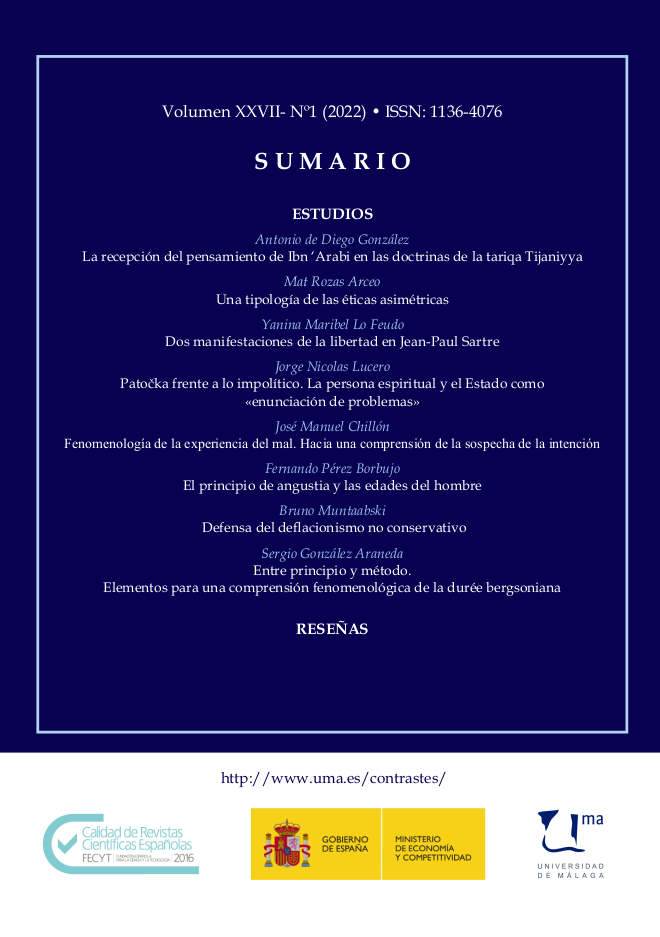A Typology of Asymmetrical Ethics
DOI:
https://doi.org/10.24310/Contrastescontrastes.v27i1.10906Keywords:
assymetry, monism, pluralism, lexicality, weighed viewsAbstract
Both in value theory and in normative theory it is usually considered that negative things and positive things have the same relevance. Some reject this idea and consider negative things more important. Here I will argue in favor of the asymmetry. Afterwards, I will examine the different asymmetrical positions we may hold. I will analyze their features and their strong and weak points. Lastly, I will claim that we have no reasons to believe that an specific asymmetrical view is superior to the others.
Downloads
Metrics
Publication Facts
Reviewer profiles N/A
Author statements
Indexed in
-
—
- Academic society
- N/A
- Publisher
- Universidad de Málaga
References
ARRHENIUS, G. (2000) “An impossibility theorem for welfarist axiologies”, Economics and Philosophy, 16, 247-266.
ARRHENIUS, G. & RABINOWICZ, W. (2015) “Value superiority” in Iwao Hirose & Jonas Olson (eds.), The Oxford handbook of value theory, Oxford: Oxford University Press, 225-248.
BENATAR, D. (2006) Better never to have been: the harm of coming into existence, New York: Oxford University Press.
BOOT, M. (2017) Incommensurability and its Implications for Practical Reasoning, Ethics and Justice, London: Rowman and Littlefield.
CHAO, R. (2012) “Negative Average Preference Utilitarianism”, Journal of Philosophy of Life, 2, 55-66.
GLOOR, T. (2017) “Tranquilism” Center on Long-Term Risk, https://longtermrisk.org/tranquilism/ [acceso 25 noviembre 2020].
GOWAN, C. (2014) Buddhist Moral Philosophy: An Introduction, London: Routledge.
GRILL, K. (2017) “Asymmetric population axiology: deliberative neutrality delivered”, Philosophical Studies, 174, 219–236.
HAMID, A. (2017) “Incommensurability in Global Ethics, The Case of Islamic Aniconism and Freedom of Speech”, Cultura 14, 37-48.
HORTA, O. (2010) “Igualitarismo, igualación a la baja, antropocentrismo y valor de la vida”, Revista de filosofía (Madrid), 35, 133-152.
Horta, O. (2011) “La cuestión del mal natural: bases evolutivas de la prevalencia del desvalor”, Ágora: Papeles de Filosofía, 30, 57-75.
MAYERFELD, J. (1996) “The moral asymmetry of happiness and suffering”, The Southern Journal of Philosophy, 34, 317-338.
MAYERFELD, J. (1999) Suffering and moral responsibility, Oxford: Oxford University Press.
NARVESON, J. (1973) “Moral problems of population”, The Monist, 57, 62-86.
PARFIT, D. (1984) Reasons and persons, Oxford: Oxford University Press.
PERSSON, I. (2009) "Rights and the asymmetry between creating good and bad lives". In Melinda A. Roberts and David T. Wasserman (eds.), Harming Future Persons. Netherlands: Springer. 29–48.
SINGER, P. (1979) Practical ethics, Cambridge: Cambridge University Press.
SCHOPENHAUER, A. (2009) The Two Fundamental Problems of Ethics, Oxford: Oxford University Press.
TEMKIN, L. (2012) Rethinking the good: moral ideals and the nature of practical reasoning, Oxford: Oxford University Press.
VINDING, M. (2020) Suffering-focused ethics: defense and implications, Copenhagen: Ratio Ethica.
Downloads
Published
How to Cite
Issue
Section
License
This journal provides immediate free access to its content under the principle of making research freely available to the public. All content published in Contrastes. Revista Internacional de Filosofía, are subject to the Creative Commons Attribution-NonCommercial-ShareAlike 4.0 license whose full text can be found at <http://creativecommons.org/licenses/by-nc-sa/4.0>
It is the responsibility of the authors to obtain the necessary permissions of the images that are subject to copyright.
Authors whose contributions are accepted for publication in this journal will retain the non-exclusive right to use their contributions for academic, research and educational purposes, including self-archiving or repository in open access repositories of any kind.
The electronic edition of this magazine is edited by the Editorial Service of the University of Malaga (Uma Editorial), being necessary to cite the origin in any partial or total reproduction.










5.png)
